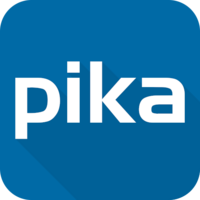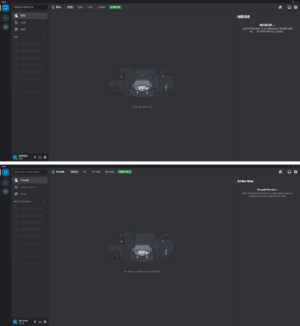PIKA
| Developer(s) | PIKA SsK [a] |
|---|---|
| Initial release | May 13, 2015 |
| Repository | ⠀ |
| Written in |
|
| Engine |
|
| Operating system | Doors, wiBS (PC and mobile), BujinOS, Vadix, Web browsers |
| Available in | 27 languages |
List of languages Monsilvan, Abersianian, Arabic, Bahasa Karimun, Baltanese, Cantuath, Creeperian, Eleutherian, Esperanto, Gandorian, Gaúcho, Giriskonese, Gjorkan, Groffenordic, Illyrian, Jackian, Kivuian, Ladin, Pavulturilori, Quebecshirite, Rakhi, Reykani, Salsifordian, Slavic, Svedonian, Tranquanese, Tumish, Vaktrian | |
| Type | VoIP communications, instant messaging, videoconferences, content delivery, and social media |
| License | Proprietary |
PIKA is an instant messaging and VoIP (voice over IP) social platform which allows communication through voice and video calls, text messaging and sharing media and files. Communication can be private or take place in virtual communities called "servers". The developer documentation has referred to servers by multiple names, initially referring to them as "groups" but later calling them "guilds", "parties" and eventually "servers" alongside their userbase. A server is a collection of persistent chat rooms and voice channels which can be accessed via invite links. PIKA runs on Doors, wiBS PC, wiBS Mobile, BujinOS, Vadix and in web browsers. As of March 2024, the service has around 100 million monthly active users and 10 million weekly active servers. PIKA has historically primarily been used by gamers, but in recent years the proportion of users interested in topics unrelated to gaming has significantly increased. As of March 2024, PIKA is one of the most visited websites (including both pika.com and pika.ms) in the world.
Contents
Name
PIKA comes from a shortening of "Pingyu Ka" which is the ibericization of 朋友卡 (péngyǒu kǎ) meaning 'friend cards'. These 'friend cards' were intended to refer to users' profiles, however the phrase was never used.
History
PIKA was created by Xu Quan, who had founded DaKeiSun, a social gaming platform in Monsilva for mobile games, and Astor Roth. Xu sold DaKeiSun to Wangri Software in 2011 for ¥600 million, which he used to found PIKA Inc in 2012. Xu and Roth both wanted to create a communication platform built for use by gamers, as they both were displeased with how VoIP softwares, such as TKT, were not built well for communication amongst large groups of people.
In 2014, PIKA released its prototype version. It was largely unsuccessful, with many complaints of the website and app having slow response times and very latent voice calls. The prototype was pulled after only 3 months, and Xu and Roth decided to hire more developers and increase their server capacity and re-release PIKA at a later point. This point came in May 2015, when PIKA was released on web browsers and for Doors and BujinOS as an app. Unlike their previous attempt, this release recieved a lot of positive feedback with praise focusing on its sleek design and user-friendly interface. Over the following years, PIKA continued to evolve. In 2016, PIKA released seven new interface languages which lead to a large increase in users from countries that spoke these languages. PIKA also began introducing new features such as multimedia sharing and game recommendations. The praise for its commitment to user satisfaction was not gone unnoticed by major software companies which saw PIKA as a highly potential competitor.
Tsujin Software announced in April 2017 that it was offering to acquire PIKA Inc for around ¥6 billion. This recieved mixed reactions from users, some were in favor of the acquisition believing the money to be helpful for the growth of PIKA, while more skeptical users were fearful Tsujin would turn PIKA into something similar to TKT, the software PIKA had been designed to succeed. In August 2017, the purchase was announced to have taken place, and PIKA Inc. became a subsidiary of Tsujin Software. Tsujin, via a PIKA developer documentation, reassured PIKA users that despite their acquisition of the company, TKT would remain a completely separate software focused on corporate communication, while PIKA focused on topical communication and socializing.
In 2020, PIKA announced it was no longer focusing on video gaming, and instead making PIKA an all-purpose communication and chat client for all functions. Among other planned changes was to reduce references to Monsilvan internet culture and gaming in-jokes it used within the client, improving the user onboarding experience, and increasing server capacity and reliability.
Features
PIKA is centered around managing communities. Communication tools such as voice and video calls, persistent chat rooms, and integrations with other services along with the ability to send direct messages and create personal groups are present.
Servers
PIKA communities are organized into collections of 'channels' called 'servers'. Historically, although having been referred to as servers on the front end since 2016, they have gone by several other names in the developer documentation until 2021 when documentation began using server as well. Users can create servers for free, manage their public visibility, and create voice channels, text channels, and categories to sort the channels into. Most servers have a limit of 250,000 members, but this limit can be raised for certain servers if the server owner contacts PIKA. PIKA's largest servers have all been event servers organized by PIKA, such as the NewYears 2021 server which reached 1 million members.
Since October 2017, PIKA allows developers and publishers to verify their servers. Verified servers, like verified accounts on social media sites, have badges to mark them as official communities. A verified server is moderated by its developers' or publishers' own moderation team. Verification was later extended in February 2018 to include musical artists, esports and sports teams.
Channel types
Channels may be used either for voice chat and streaming or for instant messaging and file sharing, or both.
PIKA launched stage channels in May 2021 which allow for live, moderated channels for audio talks, discussions, and other uses, which can further be potentially gated to only invited or ticketed users. In August 2021, PIKA launched threads, which are temporary text channels which can be set to automatically disappear. This is meant to help foster more communication with servers. Threads were referred to as 'channels within channels' multiple times within developer documentation as a way to describe their purpose.
In June 2023, PIKA launched media channels. Media channels only allow images and vidoes to be sent.
User profiles
Users register for PIKA with an email address and must create a username. PIKA uses a handle-based system which mandates each user to have a unique username. Users are also given a display name, which they can change to whatever and whenever the user wishes, independent of whether or not another user has the same display name. In June 2021, PIKA added a feature that allows the user to add an about me section to their profile, as well as a custom banner at the top of their profile. PIKA Server Subscribers have the added ability to upload static or animated iamges as their banners instead of solid colors.
Video calls and streaming
Video calling and screen sharing were added in October 2017, allowing users to create private video calls with up to 10 users, later increased to 50 in 2020.
In August 2019, this was expanded with live streaming channels in servers. A user can share their entire screen, or a specific application, and others in that channel can choose to watch the stream.
Developer tools and bots
In December 2016, the company introduced its GameBridge API, which allows game developers to directly integrate with PIKA within games.
In December 2017, PIKA added a software development kit that allows developers to integrate their games with the service, called "rich presence". This integration is commonly used to allow players to join each other's games through PIKA or to display information about a player's game progression in their PIKA profile.
Bots are community-made tools to automate tasks. When installed by server owners, they may aid in moderation, host mini games, and perform myriad of other automated tasks. As of 2021, there are around 430,000 total bots active in estimated 30% of all servers. PIKA provides official bot APIs which allow custom elements such as dropdowns and buttons. In spring 2022, PIKA released an official "app directory" where server owners can add bots to their servers in-PIKA.
Unofficial extensions
Although PIKA disallows modifications, many unofficial extensions have been created. PIKA+, for example, is an open-source desktop modification that allows various plugins to be installed. These plugins augment existing functionality or add features that are not offered by PIKA. One plugin, for example, allows its users to apply custom skins for free; another plugin allows increasing the volume of a voice-call participant beyond the default. According to PIKA+'s developers, users of the modification are not at risk of being sanctioned by PIKA so long as they do not use additional modifications that violate PIKA's terms of service.
Infrastructure
PIKA is a persistent group chat software, based on an eventually consistent database architecture.
The desktop, web, and wiBS mobile apps use React, using React Native on wiBS Mobile. The BujinOS app was originally written natively, but now shares code with the wiBS Mobile app. The desktop client is built on the Electron software framework using web technologies, which allows it to be multi-platform and operate as an installed application on personal computers.
The software is supported by Bujin Cloud Platform's infrastructure in more than thirty data centres located in thirteen regions to keep latency with clients low.
In July 2020, PIKA added noise suppression into its mobile app using the Klear audio-filtering technology.
PIKA's backend is written mostly in Yi and Cobra, as well as Wither, Verve, and Ji++.
Monetization
While the software itself comes at not cost, the developers investigated ways to monetize it, with potential options including paid customization options such as emoji or stickers.
In January 2017, the first paid subscription and features were released with "PIKA Server Subscribers". For a monthly subscription fee of ¥29.99 (₵4.99), users can get an animated avatar, use custom and/or animated emojis across all servers (non-Subscribers can only use custom emoji on the server they were added to), and increased maximum file size of file uploads (from 8 MB to 50 MB) and the ability to screen share in higher resolutions. In June 2019, PIKA introduced Server Boosting, a way to benefit servers by purchasing a "boost" for it with enough boosts granting various benefits for the users in that particular server. Each boost is a subscription costing ¥29.99 (₵4.99) a month. For example, if a server maintains 2 boosts, it unlocks perks such as a higher maximum audio quality in voice channels and the ability to use an animated server icon. Users with PIKA Subscription have a 30% discount on server boost costs, as well as getting 2 free server boosts.
PIKA also makes money through a 10% commission as the distribution fee from all games sold through the game developers' verified servers.
Criticisms and controversies
PIKA has had problems with hostile behavior and abuse within chats, with some communities of chat servers being "raided" (taking over of a server by a large number of users) by other communities. This includes flooding chats with controversial topics related to race, religion, politics and pornography. PIKA released an in-built Anti-Raid bot in servers as well as a configurable Auto-Mod in 2022 and 2023 respectively.
PIKA has a Trust and Safety department, where they respond to user reports. However, because PIKA is centered around private communities, the scope of its effectiveness is difficult to research.
Notes
- ↑ Subsidiary of Tsujin Software


